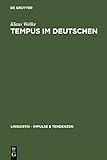Tempus im Deutschen : Rekonstruktion eines semantischen Systems / Klaus Welke.
Material type: TextSeries: Linguistik – Impulse & Tendenzen ; 13Publisher: Berlin ; Boston : De Gruyter, [2011]Copyright date: ©2005Description: 1 online resource (522 p.)Content type:
TextSeries: Linguistik – Impulse & Tendenzen ; 13Publisher: Berlin ; Boston : De Gruyter, [2011]Copyright date: ©2005Description: 1 online resource (522 p.)Content type: - 9783110183948
- 9783110925371
- 430 22
- PF3301 .W45 2005eb
- online - DeGruyter
- Issued also in print.
| Item type | Current library | Call number | URL | Status | Notes | Barcode | |
|---|---|---|---|---|---|---|---|
 eBook
eBook
|
Biblioteca "Angelicum" Pont. Univ. S.Tommaso d'Aquino Nuvola online | online - DeGruyter (Browse shelf(Opens below)) | Online access | Not for loan (Accesso limitato) | Accesso per gli utenti autorizzati / Access for authorized users | (dgr)9783110925371 |
i-iv -- Inhalt -- Einleitung -- 1 Tempus: Parameter der Zeitbestimmung -- 2 Polysemie und Invarianz: Invariantenmodelle -- 3 Eine Alternative: Prototypik -- 4 Metamorphosen eines Archetyps: Aspekt -- 5 Gegenwärtig und auch zeitlos: Präsens -- 6 Variationen auf einen Archetyp: Perfekt -- 7 Der raunende Beschwörer: Präteritum -- 8 Mehr als vergangen: Plusquamperfekt -- 9 Werden + Infinitiv: Zukunft und Modalität -- 10 Würde + Infinitiv: Modus und Tempus -- 11 Schlussbemerkung -- Abkürzungen -- Literaturverzeichnis -- Personenregister
restricted access online access with authorization star
http://purl.org/coar/access_right/c_16ec
Die Tempora, ihre Bedeutungsvarianten und ihre Oppositionen werden nicht aus invarianten Grundbedeutungen, sondern aus originären zu Grunde liegenden Bedeutungen und im Falle der analytischen Tempora kompositional erklärt. Nach Vorklärungen zu den Parametern der Zeitbestimmung und zur Prototypen- versus Invarianzmethode enthält das Buch Kapitel zum Aspekt im Deutschen, zu den traditionellen sechs Tempora und zu würde + Infinitiv.
Modern theories of tense define invariant meanings and relate these to variants using a variety of mechanisms. The present theory of tense dispenses with the principle of invariance. The individual meaning variants are derived from original meanings, and in the case of analytical tenses are explained compositionally. After introductory material on the determination of time and on the respective merits of the prototype and the invariance methods, the book contains chapters on aspect in German, on the six traditional tenses and on the structure ‛würde’ + infinitive.
Issued also in print.
Mode of access: Internet via World Wide Web.
In German.
Description based on online resource; title from PDF title page (publisher's Web site, viewed 28. Feb 2023)


